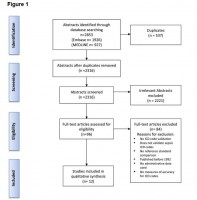Download
| File Size | 78.6 KiB |
|---|---|
| Date | July 30, 2015 |
| Downloads | 0 |
| Author | Rachel J Jolley, Keri Jo Sawka, Dean W Yergens, Hude Quan, Nathalie Jetté, and Christopher J Doig |
Abstract
Introduction: Administrative health data have been used to study sepsis in large population-based studies. The
validity of these study findings depends largely on the quality of the administrative data source and the validity of
the case definition used. We systematically reviewed the literature to assess the validity of case definitions of sepsis
used with administrative data.
Methods: Embase and MEDLINE were searched for published articles with International Classification of Diseases
(ICD) coded data used to define sepsis. Abstracts and full-text articles were reviewed in duplicate. Data were
abstracted from all eligible full-text articles, including ICD-9- and/or ICD-10-based case definitions, sensitivity (Sn),
specificity (Sp), positive predictive value (PPV) and negative predictive value (NPV).
Results: Of 2,317 individual studies identified, 12 full-text articles met all eligibility criteria. A total of 38 sepsis case
definitions were tested, which included over 130 different ICD codes. The most common ICD-9 codes were 038.x,
790.7 and 995.92, and the most common ICD-10 codes were A40.x and A41.x. The PPV was reported in ten studies
and ranged from 5.6% to 100%, with a median of 50%. Other tests of diagnostic accuracy were reported only in
some studies. Sn ranged from 5.9% to 82.3%; Sp ranged from 78.3% to 100%; and NPV ranged from 62.1% to 99.7%.
Conclusions: The validity of administrative data in recording sepsis varied substantially across individual studies
and ICD definitions. Our work may serve as a reference point for consensus towards an improved and harmonized
ICD-coded definition of sepsis.
Jolley et al. Critical Care (2015) 19:139
DOI 10.1186/s13054-015-0847-3
Introduction: Administrative health data have been used to study sepsis in large population-based studies. The
validity of these study findings depends largely on the quality of the administrative data source and the validity of
the case definition used. We systematically reviewed the literature to assess the validity of case definitions of sepsis
used with administrative data.
Methods: Embase and MEDLINE were searched for published articles with International Classification of Diseases
(ICD) coded data used to define sepsis. Abstracts and full-text articles were reviewed in duplicate. Data were
abstracted from all eligible full-text articles, including ICD-9- and/or ICD-10-based case definitions, sensitivity (Sn),
specificity (Sp), positive predictive value (PPV) and negative predictive value (NPV).
Results: Of 2,317 individual studies identified, 12 full-text articles met all eligibility criteria. A total of 38 sepsis case
definitions were tested, which included over 130 different ICD codes. The most common ICD-9 codes were 038.x,
790.7 and 995.92, and the most common ICD-10 codes were A40.x and A41.x. The PPV was reported in ten studies
and ranged from 5.6% to 100%, with a median of 50%. Other tests of diagnostic accuracy were reported only in
some studies. Sn ranged from 5.9% to 82.3%; Sp ranged from 78.3% to 100%; and NPV ranged from 62.1% to 99.7%.
Conclusions: The validity of administrative data in recording sepsis varied substantially across individual studies
and ICD definitions. Our work may serve as a reference point for consensus towards an improved and harmonized
ICD-coded definition of sepsis.
Jolley et al. Critical Care (2015) 19:139
DOI 10.1186/s13054-015-0847-3



